ERASMUS-Programm (Englische Abteilung)
Studying in the United Kingdom or the Republic of Ireland
Partner universities
How to apply
Further registration procedures
European Credit Transfer System (ECTS)
Studying in the United Kingdom or the Republic of Ireland
ERASMUS is the European Union’s mobility programme for university students. ERASMUS programmes are exchange programmes between European institutions of the same general discipline. The selection of those receiving grants is therefore made by the departments themselves. Normally students cannot apply for a vacant place in another field or faculty.
Going abroad with ERASMUS means that tuition fees at Heidelberg’s partner universities in the United Kingdom are waived. Students receive a monthly grant of approximately €150 over a period of three to five months.
Alternatively, students may also apply to other universities in the United Kingdom or Ireland and either pay the tuition fees themselves or apply for a scholarship from the German Academic Exchange Service (DAAD) or another organisation. Tuition fees may even be reimbursed by British or German grant authorities (e.g. BAföG).
Please note: tuition fees in the United Kingdom are currently subject to change (usually approximately £3000 per year, but recently universities have been allowed to charge up to £9000 per year for undergraduate programmes of study). More information may be obtained directly from the universities’ websites. – In Ireland no tuition fees are charged at the moment.
Further information on ERASMUS and other exchange programmes (e.g. with the United States, Canada, Australia, and New Zealand) is available at the Akademisches Auslandsamt (Seminarstr. 2, Room 135).
Partner universities
The English Department of the Institute for Translation and Interpreting (IÜD) currently has partnership arrangements with four universities in the United Kingdom and the Republic of Ireland. Each university offers a programme in translation studies.
- Cardiff University: two places for two semesters (September - June).
For more information, see http://www.cardiff.ac.uk/index.html - Dublin City University: five places for one semester (September – January or February – May/June). For more information, see http://www.dcu.ie
- Heriot-Watt University in Riccarton (near Edinburgh): three places for one semester (September – December or January – April). For more information, see http://www.hw.ac.uk
- Durham University: two places for two terms (October – March). For more information, see http://www.dur.ac.uk
- University of Kent at Canterbury: two places for two terms (October - March), preferably for M.A. students enrolling in post-graduate courses. Enrolling in B.A. classes is also possible, however. For more information, see http://www.ukc.ac.uk
- Universiteit Ghent: two places for one semester (September - February or February - July). The programme is in English, although it is also possible to attend courses in Dutch. For more information, see http://www.ugent.be/en
Additional places are sometimes made available by the Anglistisches Seminar, in some cases for a full academic year. More information may be obtained from the ERASMUS coordinator.
How to apply
All students, regardless of their citizenship, are welcome to apply. It is required that students be matriculated at the University of Heidelberg. Students are invited to see the ERASMUS coordinator for advice on studying abroad:
Neil M. Vandermark, M.A.
Tel.: 06221 / 54-72 32
Office hours: Wednesdays, 1 - 2 p.m., IUED -135
E-mail: neil.vandermark@iued.uni-heidelberg.de
The application period runs from mid-October until mid-January. Places are distributed by the end of the winter term for the academic year starting in September/October. Placements are as far as possible final. Applicants having to drop out, e.g. due to a shortage of funds (the cost of living in the United Kingdom and Ireland is high), because they have to repeat examinations or received another placement or scholarship (e.g. for the United States, Canada or Australia), are requested to inform the coordinator immediately of these changes in their plans or to seek guidance on the matter.
Further registration procedures
Successful applicants are requested to fill out a form stating their acceptance of the placement (Annahmeerklärung) and provide personal details (bank account number etc.). They will be contacted by the ERASMUS coordinator during the summer (May, June) with further forms required by the host university. These forms also include a learning agreement, listing subject preferences. They have to be signed by the ERASMUS coordinator and then go to the institutional coordinator (Alexandra Braye) in the ERASMUS office at the Akademisches Auslandsamt for countersigning and forwarding. For more information see http://www.eu.uni-hd.de/.
Accomodation: On due application private accommodation can be arranged in advance, either in private homes or in halls of residence. Students are contacted directly by the accommodation offices at the respective universities.
European Credit Transfer System (ECTS)
Students are advised to inform themselves about modules and, if possible, choose courses and seminars prior to their arrival at the host university. Transcripts certifying successful completion of study requirements, including test results, will be sent out by the host university usually after the students’ return to Germany. It is not possible to take classes exceeding a certain number of credits (30 or 60 depending on the system). This usually means a total of three or four modules, totalling between 10 and 14 hours of class per week. Each module involves a substantial amount of work between classes. Grades may be submitted for assessment to the ERASMUS coordinators at the University of Heidelberg for recognition as credits (e.g. in cultural studies, liaison interpreting, translation or linguistics). (More Information)
Please note: universities in the United Kingdom and Ireland expect exchange students from Germany to work just as hard as domestic students. Studying abroad is as much about exploring another country and culture as profiting from the different academic environment and courses of study. Therefore, for the continuation of the study abroad program and Heidelberg’s reputation abroad it is essential that students take their studies seriously. Thereby students will benefit most from their stay abroad.

